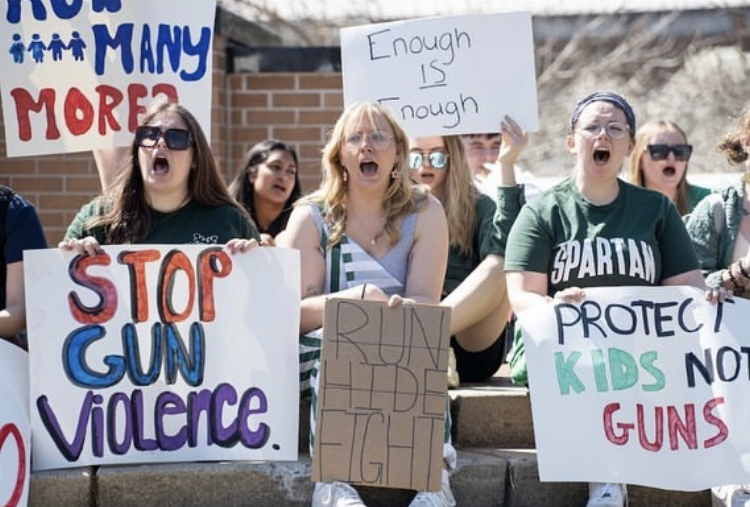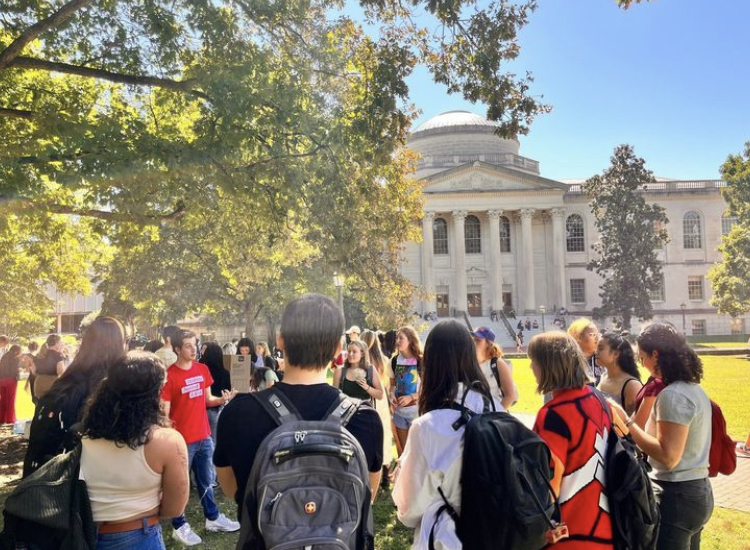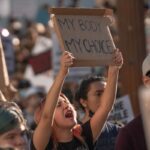
From their earliest memories, college students have lived in a world where the fear of school shootings has been a constant presence. They spent their most formative years in the aftermath of Sandy Hook, where school days were systematically interrupted by lockdown drills. And during each drill, there has always been the looming possibility that it isn’t a drill.
This threat of gun violence hangs over college campuses, too – especially with shootings at Michigan State University in February and at University of North Carolina at Chapel Hill in August. According to Everytown for Gun Safety, there have been 308 instances of gunfire on college campuses between 2013 and 2022.
In the national discourse on how to subdue the gun violence epidemic, college students are establishing themselves as central voices. In fact, 65 percent of students nationwide surveyed by Everytown said they are in favor of stricter campus gun policies. Keep reading to find out how college communities are taking action against gun violence.
Who’s Making Their Voices Heard…

- Students at the UNC Chapel Hill. The UNC community is still grappling with the aftermath of the late August fatal shooting of a professor by a student. Students, fueled by fear and anger, responded to the tragedy immediately – starting with protests at the North Carolina legislature. According to The Hill, the UNC chapter of March for Our Lives, a gun violence awareness group, chanted “Vote them out” until being removed from the chambers. The group returned to the Legislative Building in October to continue protesting, and hand delivered letters to the state’s Speaker of the House and Senate President requesting a meeting to discuss gun safety – but so far, have not been granted one.
- Vanderbilt University’s chapter of Students Demand Action. The group rallied last month outside the new headquarters for Smith & Wesson, the nation’s largest manufacturer of assault weapons, as reported by The Vanderbilt Hustler. The students, joined by members of the community, said the company has played a big role in the gun violence epidemic by rejecting gun safety education, marketing to minors and using militaristic language in advertisements. The headquarters’ location in Maryville, Tennessee, is especially alarming to protesters because of the state’s loose gun laws, which allow for open and concealed carry without permits. In addition to waving signs and chanting, the group flew a banner attached to a plane reading: “Tennessee’s new killer business guns are the #1 killer of kids.”
At One School, a New Class Is Being Offered
- It’s called “Narrative of School Shootings.” It’s the first of a series of classes related to gun violence that will be offered by the Humanities Lab at Arizona State University. The class explores how young people – whether or not they have experienced it firsthand – are impacted by the gun violence epidemic. Dean of Humanities Jeffrey Cohen said the class is not about whether people should have gun rights or not, but instead examines the factors contributing to a “culture of violence.” It also aims to open up discussions on how gun violence disproportionately impacts BIPOC communities. The next class in the series, “Guns, Art-Making and Truth” will be offered this spring, and then “U.S. Gun Culture and Gun Impacts” will be offered the following fall.
Using TikTok to Fight Gun Violence
Each year, gun reform group Project Unloaded chooses 14 members to join its National Youth Council, where they are tasked with created social media campaigns encouraging young people to join the fight against gun violence. Meet two of the council’s newest members:
- Paige Carter. The third-year Purdue student joined the council because she wants to fight back against the widely held idea that more guns is a viable solution to gun violence. She told the Journal & Courier, a local newspaper in Lafayette, Indiana, that growing up with regular school shooter drills had a drastic impact on her, especially after Sandy Hook in 2012. She noted how the fear of gun violence has become a normalcy, and said “it’s frustrating because gun violence is so much a part of our lives but we’re never involved in the conversation.”
- Karly Scholz. A third-year student at the University of Virginia, Scholz served as the Wisconsin state organizing director of March for Our Lives, a gun violence prevention organization. She helped create13 new chapters and drafted a 25-page comprehensive plan to end gun violence in her home state. She told WVIR-TV that “the big overall message is that guns make us less safe and more guns equals more gun violence.” She also believes her generation has a heightened awareness of gun violence prevention because of social media.
An AI Tool To Help Detect Guns

- Artificial Intelligence. This month, Eastern Michigan University became the state’s first college to introduce AI-powered firearm detection technology. The school signed a three-year contract with U.S.-based company ZeroEyes to install the software on 500 of approximately 1,000 cameras on EMU’s campus. It has the ability to detect firearms within view and send an alert to ZeroEyes for authentication, which then alerts the university’s Department of Public Safety. The EMU Chief of Police Matthew Lige told The Eastern Echo that this new feature will ideally act as an aid to first responders, and “hopefully prevent an act of violence on this campus.”
An Issue That Impacts Black and Brown Students
These schools are adjusting their gun policies – but some worry these changes will negatively affect minorities, who are at greater risk in general of being killed by police and who are arrested at higher rates for carrying concealed weapons:
- George Washington University. The Washington, D.C., college began arming campus police this semester, despite major pushback from students. The campus group Students Against Imperialism calls the change an “attack on Black and Brown students.” A petition pushing back against this decision has garnered 700 signatures, but campus police are standing by their choice to arm officers. According to Fox News, Law Professor John Banzhaf stated that most universities arm their police officers, and called students’ objections “naïve.”
- Michigan State University. Ever since 1988, students, staff and faculty at MSU have been banned from carrying firearms inside campus buildings – but because of the way this rule was worded, there was a loophole that technically allowed for open carry in outdoor spaces on campus. However, the Board of Trustees finally voted to close that loophole this fall, banning firearms on all campus property – a change that comes ten months after the Feb. 13 MSU shooting that killed three students and left five badly injured. However, two out of the seven board members voted against this change, with Board Chair Rema Vassar expressing concern that it would lead to disproportionate policing of minorities in a way that’s “disparaging” and “discriminatory,” according to UpNorthLive.
Insight From College Women on the Gun Violence Epidemic
- In her essay for The Duke Chronicle, freshman Bella Naspinsky wrote about the horror of not knowing if her brother – who goes to UNC Chapel Hill – was OK during the August shooting.
- Aashna Nadarajah and Margaret Hartigan wrote an in-depth feature for The Georgetown Voice about how students are advocating for gun reform in Washington, D.C.
- In a piece for The Hawk, Saint Joseph’s University freshman Rose Blocher recalled moving into her Philadelphia dorm and making sure she knew how to open the window in case she needed to escape a shooting.



